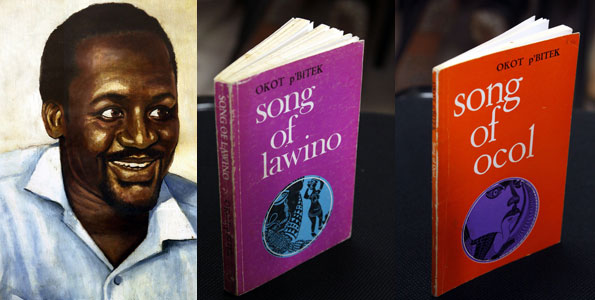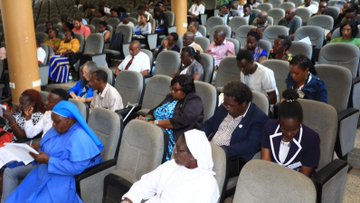Prof Charles Okumu has paid a glowing tribute to one of Uganda’s greatest poets, Okot p’Bitek, who achieved wide international recognition for Song of Lawino, a long poem dealing with the tribulations of a rural African wife.
Prof Okumu was Thursday delivering a keynote address on “The Life and Times of Okot p’Bitek: Structured Biography and Excursions into his Creative Writings” during the 6th Mashariki (Eastern African) Literary and Cultural Studies Conference held at Yusuf Lule Central Teaching Facility, Makerere University, Kampala.
Prof Charles Okumu is an Associate Professor of Literary and Cultural Studies at the Department of Languages and Literature, Faculty of Education and Humanities at Gulu University.

According to him, Okot’s father was a great storyteller and that’s where he learnt how to tell and write stories.
“Okot says the structure of the building reflects what is inside. Okot was appointed a professor of creative writing because it was specifically curved out for Okot.”
Prof Okumu also touched on Okot’s works on religion where he wrote about how the Acoli celebrate their god, not the Christian god. Okot dropped his name because of his disagreements on religion.

Okot kicked himself out of his mother’s womb
“Okot says he was not born, he kicked himself out of his mother’s womb. He was born in the kitchen of one of the missionaries,” he narrated, adding that the house has been restructured but the main house still stands.
His intelligence came from sugarcanes
Prof Okumu praised Okot as a brilliant student who never failed.
“Okot’s best subject was not English, it was Mathematics. His explanation for being so smart in mathematics was that he got his intelligence from eating sugarcane but what he did was promote his father’s sugarcane. The father knew the kids would go and steal the sugarcane, so, he told them there was a big snake and that it was the way he would stop them from plundering so that they would be able to ask for it.”

He added: “Everybody in the mission knew Okot. They knew him for being intelligent, and an athlete but he was also very handsome.”
Okot went to Gulu High School and then King’s College Budo.
According to Prof Okumu, Okot who came from Gulu, was a Mukopi (commoner) but the school was opened up to non-royal children.
“He went there on merit. Okot was intelligent and active in extra-curricular activities but he spent more time in extra activities and it affected his grades.”
Okot decided to do Law because he wanted to become a politician. “He almost joined the politics in Acoli Land. Okot joined UNC which later became UPC. He drafted a paper “Path to Uganda’s Freedom”.”

Rejected by Acholi princess
This commoner once proposed to his beautiful Acholi girl from a royal family but he was rejected.
“He was the only child and would get his way around and he was not ready to get rejected. Instead of sulking, he went and composed an opera and, in the song, he says, poverty is not permanent,” notes Prof Okumu.
The first break for Okot was the winning performance. Former Ugandan writer, political figure, and sportsman, the late John Nagenda, helped in polishing his song.

Okot then became more popular and his girlfriend became envious of him. “He extended the theme of rejected love to a full novel.”
Okot’s literary works
“In his book “Decolonizing African Religions”, Okot disabuses the idea that Africans are animalistic. His book “White Teeth‘ is based on his rejection by Cecilia.
“If you have not heard of the book ‘Song of Lawino’, then you have not read literature,” says Prof Okumu.

Okot P’Bitek emphasized the importance of beauty while he wrote. He strived to document the ideals of the Acoli people.
According to Prof Okumu, Okot was employed by the University of Nairobi in 1968. In 1978, he went to Nigeria and spent his time at the Ife University. He did this with David Rubadiri.
“A position of creative writing was created in Makerere specifically for Okot P’Bitek. He told Makerere that his books were his applications.”
“Okot’s problem was where do you place him? In literature, Anthropology, etc.. His colleagues rejected him because he did not have a Master’s degree.”
He added: “My conclusion is that Okot overlived, overstretched his life. He died at the age of 51. That is my friend, unfortunately, he died too young.”









